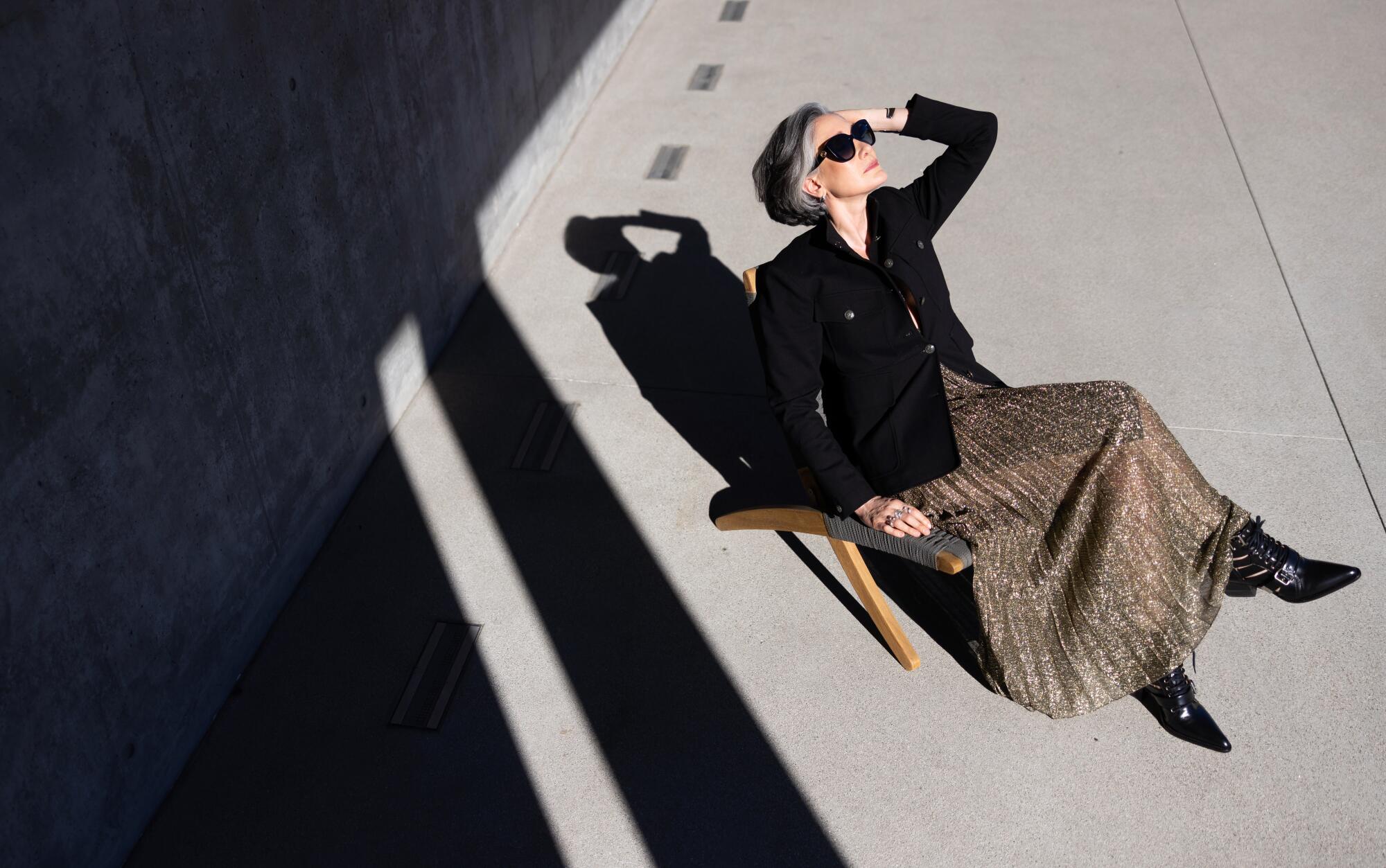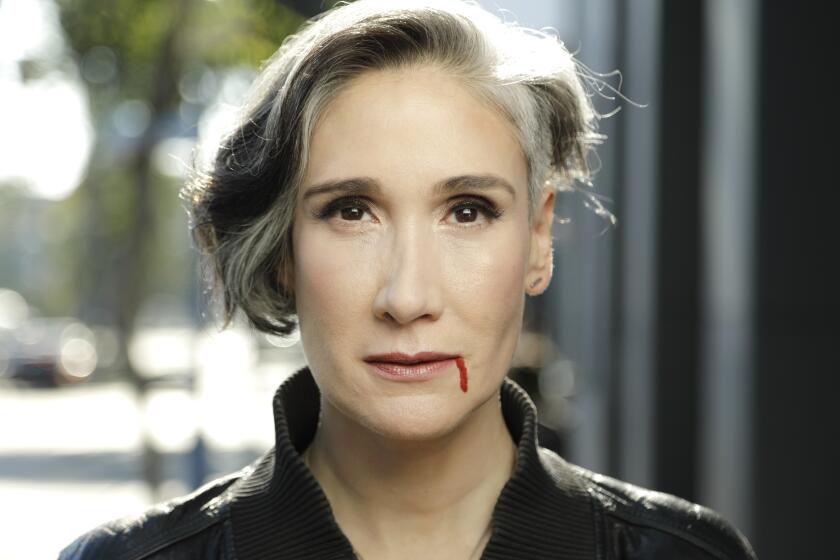
- Share via
In the thick of the pandemic, Issa López decided to test herself by writing a murder mystery. The screenwriter and director had been plugging away at drafts of scripts and was losing her mind a little bit, she remembers.
While other people might have turned to doing puzzles with friends, she decided to build one of her own. “I decided to tackle a challenge I thought was impossible,” she says. “I loved murder mysteries my entire life. I grew up with a truly not healthy obsession with Sherlock Holmes.” (When I ask what that means, she tells me to think of a tween girl with a “truly obsessive crush on a fictional Victorian cocaine addict.”)

López started to concoct a stew that combined her love of Holmes with some other pop culture fascinations, including the detective team in David Fincher’s “Seven,” the Arctic terror of John Carpenter‘s “The Thing” and a general interest in the real-life “unsolved mysteries of humankind.” She let it boil, and then put it aside. Then HBO called, asking her what she would do if she were handed the reins to the “True Detective” franchise.
The result is “True Detective: Night Country,” the fourth season of the series that premiered Sunday, which stars Jodie Foster and Kali Reis as detectives in rural Alaska investigating the circumstances that led a group of researchers to be found naked and frozen together on the vast and eerie ice. López directs every episode and is the creator and showrunner of this new incarnation of the series, which started with Matthew McConaughey and Woody Harrelson opining about the notion of time in the Louisiana heat (Nic Pizzolatto was the creator and writer for the first three seasons).
For López, who hails from Mexico City but is now based in Los Angeles, “Night Country” is both her biggest, most high-profile project to date and one that is deeply personal, with roots in the trauma she experienced as a child following her mother’s death. It’s an experience that has informed her work for years now, including her indie horror feature “Tigers Are Not Afraid,” a mystical tale about children caught up in cartel crossfire that became her calling card and prompted HBO to come knocking.
Mexican filmmaker Issa López has scored an international breakthrough with the genre film “Tigers Are Not Afraid,” which counts Guillermo del Toro and Stephen King as fans and is finally making its U.S. debut via Shudder.
Working with López has been a unique experience for Foster, who says in a phone interview that she’s rarely collaborated with someone who has such a range of abilities — from the technical to the more intangible. “[She’s] just deeply emotional and articulate emotionally in a way that I’ve never really had with a director,” Foster says.
Before she was dealing with dead bodies and mysterious symbols, López made her name in her home country working in comedies, the most commercially viable genre when she started her career. But in 2009, when she tried to transition from the Mexican film industry to Hollywood, she found that comedies weren’t as popular as they had been. Her deal to come to America fell through. “I realized that the only way was to go back to my very, very, very dark, f— up roots,” she says.
López’s mother died suddenly when she was 8 years old. Not a violent death, but it was one where she never had the opportunity to say goodbye. She wasn’t even allowed to attend the funeral, the adults in her orbit thinking it would be too traumatic for a little girl to see her mother in a coffin. That lack of closure has followed her throughout her life and into her art.

“Then you have this feeling, even if you know rationally that this person is dead and gone, a part of you is kind of expecting to find them around the corner throughout your entire life,” she says. “And I think that informs my storytelling — the sensation of the sudden loss of someone who is the center of your life is very much the story in ‘Tigers’ and is very much the story of ‘True Detective.’”
In “Night Country,” this manifests as a clash between Foster’s Liz Danvers, a pragmatist who buries her feelings of grief over the loss of her son, and Reis’ Evangeline Navarro, who wrestles with visions of the dead. After the mass of dead scientists are found in what López calls the “corpsicle,” Danvers and Navarro are thrust back into partnership to figure out what became of these men and how it relates to the death of a local Indigenous woman and the local mine that activists say is polluting the environment.
López, a massive fan of “The Silence of the Lambs,” wrote the part of Danvers for Foster, and while Foster was immediately taken with the script, she wasn’t sure about taking on the role, concerned that she wasn’t quite right for it. Taking Foster’s concerns into consideration, López reshaped Danvers. “I’m not going to say this is one of the first times, but I feel like this is one of the best times of being heard,” Foster says.
The new version of Danvers that emerged was more of an “a—,” López says. “It came so naturally, a lot of my friends were like, ‘Oh, now she feels like you.’ I was like, ‘Thank you, I don’t know if that’s a good thing.’” She has decided to take it as a compliment.
Initially, López had written Navarro as a Latina, like herself, but the more she came to learn about Northwest Alaska, the more she knew the series had to deal with violence against Inuit women. “The more I understood that, at least half of my detectives had to come from that background,” she says. “Because I’m done and I’m tired of police investigators that come from the outside figuring out the case of the murdered and missing Indigenous women.”
Pro fighter Kali Reis makes a bruising debut in the indie crime thriller ‘Catch the Fair One.’
Because she started writing when COVID travel restrictions were tight, López’s initial research on the region consisted of immersing herself in TikTok and YouTube videos, listening to local radio stations and watching reality shows like “Life Below Zero.” As soon as they could, she and a small group of producers went on a journey to Alaska, specifically to Nome and Kotzebue, where they walked along the frozen ocean and met with residents. “We ate the caribou and ate the seals that they hunt as part of their culture,” López remembers. “Listen, I don’t eat meat, but I did eat meat with them.”
López says she never goes into projects thinking about the politics of them, but it became obvious that focusing on the clash between the Inuit community of a Northwest Alaska town and the white population was inevitable.
“Her worldview is very wide in scope, and I think it affects her personally, deeply,” says executive producer Mari-Jo Winkler.
López also didn’t approach this incarnation of “True Detective” with the intention of subverting the first season, but that happened as well. Instead of naked female corpses analyzed by two men, we see the inverse: two women inspecting naked male corpses. “Now that I look in retrospect, it’s so clear,” she says. But it wasn’t intended as “revenge.” It just happened naturally. “You don’t tell the story what it has to do, the story tells you,” she adds.

López didn’t necessarily expect to direct every episode, but having come from the world of indie movies where she had a hand in all aspects of production, being involved every step of the way made sense both to her and her collaborators like executive producer Barry Jenkins, the Oscar-winning director of “Moonlight.”
Jenkins himself has directed an entire season of television with Prime Video’s “The Underground Railroad.” “It is grueling and yet it is also, when you come off the other side of it, one of the most satisfactory, one of the most fulfilling experiences you can have in this creative medium, and it just felt like Issa was ready for that because she is strong as hell,” he says. “Pardon my French, but a bad motherf—.”
Foster says that during shooting in Iceland, López, who is very funny, was beloved on set. “People just adored her and it made them work harder,” she says.
The, yes, very cold shoot was difficult but also beautiful, López says, remembering how they would pause shooting to take selfies when the Northern Lights shone above them. Still, she’s not rushing to make another project in those temperatures.
As for what López does next, that will depend on how “Night Country” is received, but she does have another television murder mystery in her arsenal. She’s gotten the bug for the genre and has been satisfied that, so far, no one who has seen the whole series has told her they guessed the twist.
“If you look at it, it is there,” she says. “I’m giving you enough so that when I give you the solution you don’t go like, ‘Oh, you tricked me,’ but you go like, ‘Oh, I didn’t see it.’ Because that’s so satisfying and that was exactly my ambition when I set out to write a murder mystery.”
It turns out, her pandemic gamble and childhood fixation with Sherlock Holmes paid off.
More to Read
The complete guide to home viewing
Get Screen Gab for everything about the TV shows and streaming movies everyone’s talking about.
You may occasionally receive promotional content from the Los Angeles Times.








